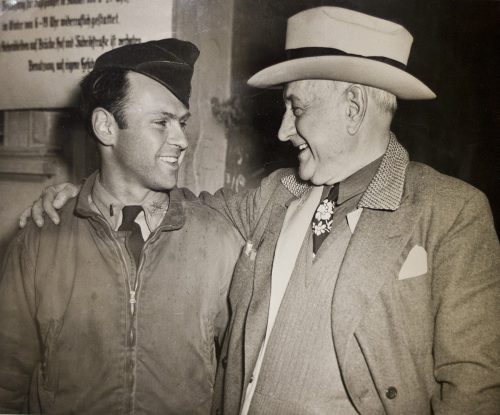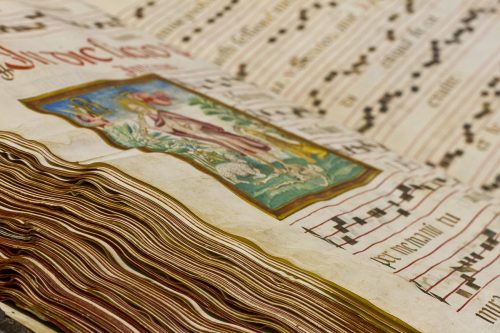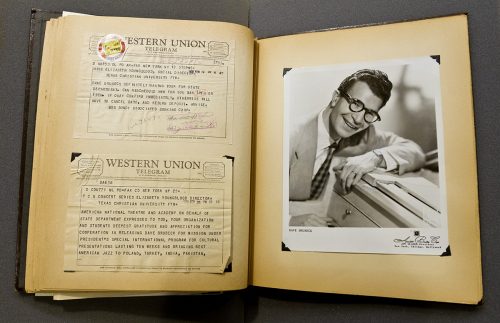A Look Inside Special Collections
The library’s vault of historic writings and artifacts chronicles the history of TCU and Fort Worth.
A Look Inside Special Collections
The library’s vault of historic writings and artifacts chronicles the history of TCU and Fort Worth.
Special Collections isn’t just an archive but a well of knowledge useful for students, faculty and researchers alike. It is something of a haven in the Mary Couts Burnett Library.
Along with former U.S. House Speaker Jim Wright’s personal papers are rare books, old scrapbooks and TCU-related historical documents.
“[They are] items in the library that we don’t let circulate,” said Mary Saffell, senior archivist for Special Collections. She said the items are “unique, rare or irreplaceable.”
Located on the library’s third floor, the archives house historical documents and artifacts, such as university-related sports memorabilia. Inside “the vault” — a secure room filled with boxes, books and more — are the personal papers of some of Fort Worth’s prominent citizens.

Lt. Amon Carter Jr. with his father, Amon G. Carter, after the younger Carter was released from a German prison camp in 1945. Amon G. Carter was a prominent Fort Worth figure and publisher of the Star-Telegram. His archival papers are in Special Collections. Courtesy of the Mary Couts Burnett Library’s Special Collections
Besides Wright’s collective papers, Special Collections holds the archival papers of Amon G. Carter, who once owned the Star-Telegram daily newspaper in Fort Worth and has an art museum that bears his name.
Carter’s slew of historical documents catalog his rise as a businessman and football junkie. “[They cover] his business ventures in publishing and oil and aviation, and his goal to boost Fort Worth and boost the profile of Fort Worth,” Saffell said, citing the Carter papers as among the most visited archives in Special Collections.
Historical documentation is one of the main values of the archives, Saffell said. The library’s special unit can trace TCU’s growth going back to Thorp Spring and Waco, Texas. The collection of papers, she said, “documents the administration, student life and academics.”
Also in the vault are student-made scrapbooks from a young university campus, which Saffell likes because “they show how many things have changed, but a lot still stay the same.”
Other items include a large selection of books, with some dating to the European Renaissance. Saffell said these books are a great resource for student researchers and a teaching tool for faculty.

Detail of the 17th-century Mixson-Colquitt Gradual, which is among the rare books in Special Collections at the TCU Library. It was donated by Dr. Catherine Colquitt in memory of her parents, former TCU faculty Betsy and Landon Colquitt and in honor of Linda and Keith Mixson. Photo by Mark Graham
A 16th-century hymnal from a monastery was front and center in the vault. The massive leather-bound book contains handwritten songs. Saffell said other books span such subjects as English, literature, art and history.
Special Collections also holds works of authors and novelists. Noteworthy journalists in the collection include Grace Halsell, who wrote for the Star-Telegram, said Lisa Peña, a library specialist who works in Special Collections.
“We don’t necessarily have certain subjects,” Peña said, “and things have kind of spread out over the years to include more and more collections.”
One of the librarian’s personal favorites is Civil War letters from the Love family of Fort Worth. “To me, that is a really neat reflection of history, of a Fort Worth family,” she said. “It’s a lost art of writing letters.”

Western Union telegrams tell about Dave Brubeck concert stops at TCU and elsewhere in 1958. The scrapbook is part of the Special Collections at TCU’s Mary Couts Burnett Library. Photo by Mark Graham
Academic researchers and TCU classes comprise the main visitors to the collections, though it’s open to the public as well. So far in 2018, more than 500 visitors have used the archives, the most Peña said she has seen in her 20 years at the university.
A robust digital catalog makes most of the collections viewable online, but, Saffel said, some historical items are best seen in person.
She said the library’s archivists are precise in what they choose for inclusion in the university’s collections. “There are appraisal questions,” Saffell said, “not monetary but the informational value.”
Special Collections will take anything of historical or academic value, but the library’s archivists have a pointed interest in Fort Worth natives, especially TCU graduates. In paraphrasing the often-repeated words of Horned Frogs who have donated items to the library, Saffell said many offer their personal artifacts with this reason: “I got my start going to TCU. That’s where I would want my papers to be.”

Your comments are welcome
Comments
Related reading:
Features
Jim Wright Journals Offer Inside View of Political Life
In diaries left to TCU, the congressman talks politics and power.
Letters
Chancellor’s Letter: We’ve Got the Wright Stuff
Congressman Jim Wright’s papers are now part of Mary Couts Burnett Library’s Special Collections.
Campus News: Alma Matters
Infographic – Library Facts
We break it down, book-by-book.